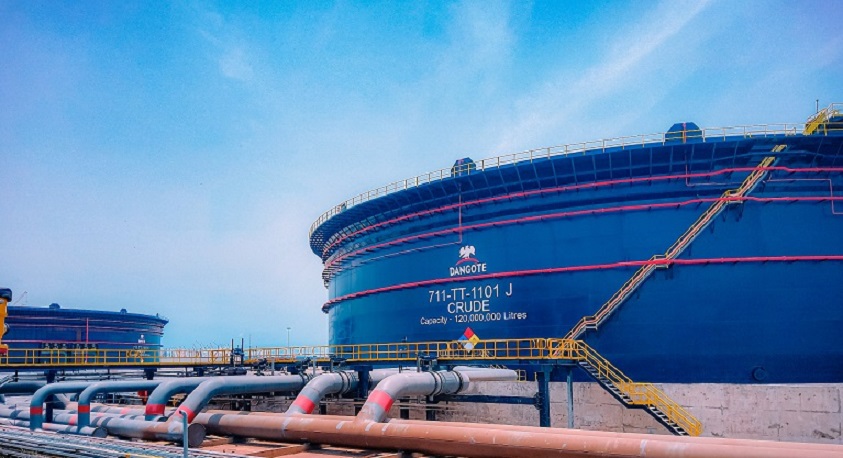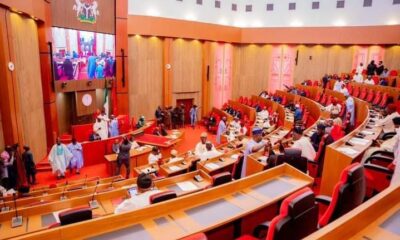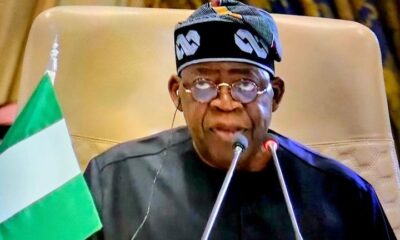NEWS
Onoh Urges Nigerians To Support Fuel Subsidy Removal, Gives Reasons
Dr. Josef Onoh, a former spokesperson for President Bola Tinubu in the south east, has emphasized the importance of removing Nigeria’s high expenditure on petroleum subsidy. According to him, redirecting these funds towards other sectors of the economy would directly improve the lives of middle and low-income citizens.
Although President Tinubu has not officially announced the withdrawal of the controversial oil subsidy, Dr. Onoh urges Nigerians to consider the actions of other countries, particularly in Africa, that have taken the bold step of eliminating the substantial costs associated with subsidizing the consumption of foreign petroleum products.
He highlights that such subsidies often disproportionately benefit the wealthy, who own multiple vehicles, rather than the poor citizens who rely on public transportation systems.
Free Research Preview. ChatGPT may produce inaccurate information about peopl
Onoh urged Nigerians and whichever groups that are warming up for agitation against the new government of Bola Tinubu to be critical and understand that President Tinubu did not remove the oil subsidy by himself, but should know that no provision was made in the 2023 appropriation to fund the luxury of subsidizing the importation of petroleum products which as at today stands at $867 million or N400 billion every month, for products that are essentially consumed by the upper class or go out the country through smuggling, because the products are cheaper in Nigeria than its neighboring countries.
Onoh cited other African countries that had done away with oil subsidy such as Ghana that was spending $25.6 million every two weeks on fuel subsidy before the country cut off the strangulating yoke and had become free and stable after the old Gold Coast liberated itself from the subsidy bondage.
He also made a comparison with Republic of Cameroon which removed subsidy on oil and deregulated its markets, adding that even Nigeria experts such as the President of African Development Bank (ADB), Dr. Akinwumi Adesina had also prescribed the removal of oil subsidy with its high cost on the Nigerian economy of $10 billion in 2022.
Citing more instances of other African countries that have made testimonies of their break through with the removal of subsidy in oil, Onoh gave the example of Egypt which in 2019 broke off completely with the subsidy oppression and implemented an International Monetary Fund (IMF) economic overhaul template, even when gasoline, diesel and kerosene were sold at 85 to 90 percent international cost within Egypt before it completely broke the yoke and liberated the country from the economic strangulation.
Onoh said that it was not only Tinubu who agreed that subsidy on oil should be removed, recalling that during electioneering campaign period and debates, all the presidential candidates of different political parties supported removal of oil subsidy.
“Ghana removed the subsidy after 30 years, and if you look at the progress and the economic stability in the present day Ghana, Nigerians will know that we cannot continue with oil subsidy at the detriment of our economic stability. Both the rich and the poor will face hardship but we should look at the collected benefit rather than the immediate hardship.
“There is no other way because we are caught in-between the devil and the deep blue sea. There is no way we can continue benefiting the rich while the poor get poorer. The only way we can have a balanced economy is when even the poor can have access to these basic needs. In the short term, the removal will cause panic but the cabals behind the refusal to remove the fuel subsidy are the greatest beneficiaries of that subsidy.
“So, they will play in the minds of the innocent poor, trying to make it look as if the government is against the poor, but the Tinubu administration is eager to balance our economy just like other countries have done. We should sustain that confidence,” Onoh said.
He noted that Canadian government, United Kingdom, the United States of America and other foreign countries will all show more confidence in the Nigeria economy.
“But we also need to show that we want our economy to grow and we cannot continue to rely on half term measures, riding on a Tiger’s back, not thinking it could as well turn around to kill us. So we should back this administration.
“The test of our Progress is not whether we avoid temporarily removing the fuel subsidy out of fear of hardship for Nigerians which in turn will add to the abundance of those who have much and beneficiaries of the subsidy, rather it is whether the current administration provides enough after it’s removal for those who have too little,”Onoh encouraged.
NEWS
Tinubu, AGF Snub Suit Seeking To Sack Rivers’ Sole Administrator
A suit challenging President Bola Tinubu’s controversial appointment of a Sole Administrator for Rivers State suffered a setback on Thursday as the President and the Attorney-General of the Federation, Prince Lateef Fagbemi, SAN, failed to appear or send legal representation before the Federal High Court sitting in Abuja.
The matter, brought before Justice James Omotosho, was instituted by Abuja-based legal practitioner, Mr. Johnmary Jideobi, who is urging the court to declare the appointment of Vice Admiral Ibok-Ete Ekwe Ibas (Rtd) as unconstitutional and to nullify the suspension of the state’s elected Governor and Deputy Governor.
READ MORE: BREAKING: HURIWA Urges Supreme Court To Dispense Justice Quick On Rivers Emergency Rule
Although the Attorneys-General of Lagos, Bayelsa, Taraba, and Edo states were present and announced their appearances, the absence of legal representation for both the President (1st Defendant) and the AGF (2nd Defendant) drew attention during the proceedings.
Plaintiff’s counsel, Mr. Chimezie Enuka, confirmed to the court that all parties—except the Attorneys-General of Zamfara and Bauchi states—had been properly served with the originating processes and hearing notice.
Following a consensus among the present legal teams, Justice Omotosho adjourned the matter to June 11, 2025, and ordered that fresh hearing notices be issued to all defendants.
The suit, filed under number FHC/ABJ/CS/572/2025, has Tinubu, the AGF, and the 36 state Attorneys-General listed as defendants. Jideobi is asking the court to set aside all decisions and actions taken by Ibas in the name of a Sole Administrator, arguing they lack any constitutional basis.
In his affidavit in support of the suit, the plaintiff asserted that President Tinubu does not possess the constitutional powers to suspend elected state officials or to appoint unelected figures to govern in their place.
“As a Nigerian lawyer and all through my years of practice, I have never seen the word ‘Sole Administrator’ in the amended 1999 Constitution of the Federal Republic of Nigeria,” Jideobi stated.
“I know that neither the 1st Defendant nor the 2nd Defendant appointed the Governor and Deputy-Governor of Rivers State of Nigeria and that no Governor or Deputy Governor in Nigeria is an appointee of the 1st and 2nd Defendants,” he added.
The plaintiff contends that the only constitutionally recognized grounds for removing or interrupting the tenure of elected Governors and their deputies are outlined in Sections 180, 188, 189, 305, and 306 of the 1999 Constitution, as amended.
He is therefore seeking a declaration from the court that the President has “NO constitutional authority to either remove, suspend or otherwise tamper with the tenure of a duly elected Governor and Deputy Governor of a State and appoint a sole Administrator [or any other substitute howsoever called or described].”
Jideobi warned that unless the court intervenes, “removal of duly elected Governors and Deputy-Governors may become the pastime of the President, thereby opening the floodgate of anarchy capable of consuming this nation.”
He added: “I have instituted this suit in the public interest, in the defence of the Rule of Law and accentuation of the supremacy of the Constitution… It will be in the interest of justice for this Honourable Court to grant the prayers contained on the face of this Originating Summons.”
Among the specific reliefs sought are an order setting aside the suspension of the Governor and Deputy Governor of Rivers State, a nullification of Ibas’ appointment, and a directive ordering him to vacate the Government House immediately.
NEWS
NLC Shuts Down Ministry Of Mines Over 20-Year-Old Unlawful Dismissal
In a dramatic show of solidarity, members of the Nigeria Labour Congress (NLC) staged a picket outside the Federal Ministry of Mines and Steel Development’s headquarters in Abuja.
The protest was sparked by the ministry’s refusal to comply with a court order for the reinstatement of Comrade Victor Ekpaha, who was dismissed from his position more than 20 years ago.
READ ALSO: Tariff Hike Protest: Telecoms Union Backs NLC’s Suspension Of Protest
The workers’ action resulted in the shutdown of the ministry’s operations, as they called for Ekpaha’s immediate reinstatement and the payment of his full salary, allowances, and other benefits for the over two decades that the case has been unresolved.
The NLC has expressed its determination to continue pressuring the ministry until the court ruling is respected and Ekpaha is fully compensated for the years of unpaid entitlements.
The union has also emphasized the broader issue of labor rights and justice, urging the government to address such longstanding grievances.
More to follow………………
NEWS
JUST IN: Dangote Refinery Cuts Petrol Price To N865 Per Litre

The Dangote Refinery has announced a N15 reduction in its ex-gantry loading cost, bringing it down to N865 per litre from the previous price of N880.
The new price, confirmed by a pro forma invoice and verified by petroleumprice.ng, was communicated to customers in a notice on Thursday morning.
This price adjustment follows earlier reports that the 650,000 barrels-per-day refinery was expected to lower its petrol loading costs by the end of this week.
The reduction is expected to further drive down fuel prices in the country, providing some relief to consumers.
READ MORE: ECCIMA Applauds Dangote’s Impact On Nigeria’s Economy
Chinedu Ukadike, National Publicity Secretary of the Independent Petroleum Marketers Association of Nigeria (IPMAN), assured the public that the price drop aligns with the Federal Executive Council’s recent directive on the Naira-for-Crude agreement.
“We are confident that this price reduction will be beneficial for the Nigerian people,” Ukadike said.
In a related development, the Federal Executive Council has authorized the full implementation of the long-suspended Naira-for-Crude agreement with local refiners.
This policy aims to reduce Nigeria’s reliance on foreign exchange for petroleum imports and boost local refining capacity.
The Ministry of Finance released a statement following a meeting between Finance Minister Wale Edun and Dangote Refinery officials.
The statement emphasized that the Naira-for-Crude initiative is a long-term policy, not a temporary measure.
“The initiative is designed to support sustainable local refining, enhance energy security, and reduce the country’s dependency on foreign currency for petroleum products,” the Ministry’s statement read.



















